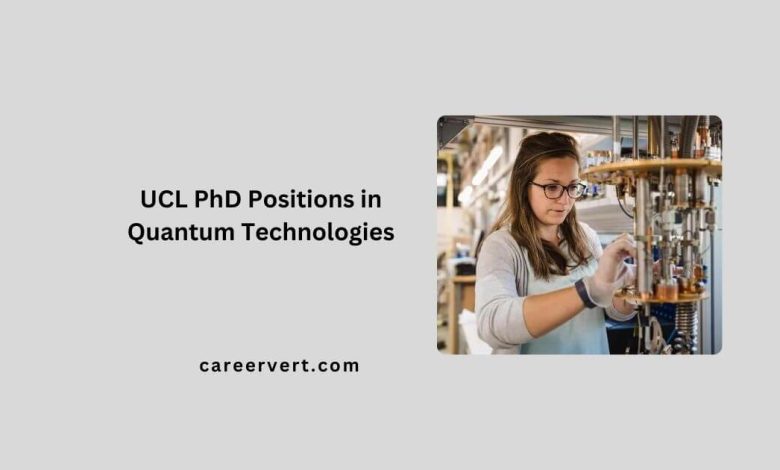UCL PhD Positions in Quantum Technologies 2024

Greetings, esteemed viewers! Today, we will delve into the realm of quantum technologies and investigate the thrilling prospects that await UCL (University College London) in 2024. UCL is currently offering several exceptional PhD positions for individuals who are passionate about furthering their research and knowledge in quantum technologies. Additionally, there is a silver lining: scholarships that may facilitate your academic voyage. So, take a cup of your preferred beverage, and let’s delve into the specifics.
UCL PhD Positions 2024 in Quantum Technologies:
Quantum technologies are transforming our world, with transformative impacts on navigation systems, medical imaging, and beyond, in addition to revolutionizing computation and secure communications. In 2024, UCL is offering PhD positions that will facilitate your immersion in this captivating realm, as it is acknowledged for its innovative research.
Imagine being a member of a team that is redefining the limits of what is feasible, collaborating in cutting-edge facilities with world-renowned professionals. There is a position for you here, regardless of whether you have a background in physics, engineering, computer science, or applied mathematics. The multidisciplinary environment at UCL guarantees that you will be at the forefront of innovation, contributing to research that has the potential to shape the future of technology.
What You Need to Know:
By obtaining a PhD in quantum technologies at UCL, you will become a member of a dynamic community. You will have the opportunity to address real-world issues and utilize state-of-the-art methodologies and apparatus. Quantum computation, simulation, quantum sensing, and cryptography are among the subjects that may be addressed. The primary objective is to cultivate scientists who are not only proficient in theory but also capable of advancing technology.
Check Also: PhD Placements at CODE Network Throughout Europe
Benefits of UCL PhD Positions in Quantum Technologies:
- Research Environment at the Cutting Edge: UCL is a preeminent institution in the field of quantum technologies, providing access to cutting-edge facilities and resources. PhD candidates can conduct groundbreaking research by collaborating with world-class researchers and utilizing state-of-the-art laboratories, instruments, and computational resources.
- Interdisciplinary Collaboration: Quantum technologies are interconnected with a variety of disciplines, such as engineering, computer science, materials science, and physics. UCL encourages interdisciplinary collaboration, which enables PhD students to collaborate on projects that incorporate methodologies and insights from various disciplines, thereby improving the quality and impact of their research.
- Access to Prominent Experts: Direct interaction with prominent experts in the field is a benefit to students in UCL’s quantum technologies program. Students are frequently afforded mentorship, guidance, and opportunities to participate in high-impact research projects by faculty members who are frequently at the vanguard of quantum research and are involved in international collaborations.
- Robust Industry Connections: UCL has forged partnerships with a diverse array of industries, such as government agencies, technology corporations, and research institutions. PhD candidates in quantum technologies are afforded the chance to participate in industry-sponsored research projects, internships, and training programs, which significantly improves their employability and practical skills.
- Opportunities for Funding: UCL provides a variety of funding alternatives for PhD students, such as stipends, grants, and scholarships. Government and private funding sources provide support for numerous quantum technologies initiatives, thereby facilitating the pursuit of research by students without financial constraints.
- Career Development and Networking: Numerous networking opportunities are available to students due to UCL’s robust reputation in quantum research. PhD candidates have the opportunity to engage with professionals, academics, and potential employers in the quantum technology sector by attending conferences, workshops, and seminars.
- Emphasize practical applications: Practical applications, including quantum computing, quantum cryptography, and quantum sensing, are frequently the focus of research in quantum technologies. At UCL, PhD students are encouraged to investigate the practical implications of their research, thereby improving their capacity to make a meaningful contribution to technological advancements that have the potential to revolutionize industries.
- Prioritization of Innovation: UCL fosters an environment of innovation, which motivates PhD candidates to engage in innovative thinking and investigate novel concepts. Due to the university’s encouragement of entrepreneurship and technology transfer, students are able to transform their research into commercial enterprises, thereby contributing to the expansion of the quantum technology sector.
- Access to a Global Research Community: UCL is a member of a global network of premier research institutions that are dedicated to quantum technologies. PhD candidates are allowed to engage in joint research projects, participate in exchange programs, and collaborate with international researchers, thereby expanding their global perspective and research experience.
- Contribution to Revolutionary Research: PhD students at UCL frequently participate in research that challenges the limits of knowledge in quantum technologies. Students can enhance their academic profiles, publish their work in high-profile journals, and make a significant impact in the field by contributing to groundbreaking initiatives.
- Enhancement of Technical Proficiency: The PhD program in quantum technologies at UCL prioritizes the acquisition of sophisticated technical skills, such as experimental techniques, data analysis, and programming. These abilities are indispensable for conducting advanced research and are highly esteemed in both academic and industrial environments.
- Comprehensive Training and Support: PhD candidates are provided with comprehensive training and support by UCL, which includes workshops on scientific writing, research methodologies, and presentation skills. This program assists students in the acquisition of critical skills that are essential for their academic and professional pursuits, thereby guaranteeing that they are adequately equipped to confront future obstacles.
- A Wide Range of Research Areas: UCL’s quantum technologies program incorporates a diverse array of research areas, such as quantum optics, quantum computing, quantum communications, and quantum materials. This diversity enables PhD students to select initiatives that are consistent with their career objectives and interests.
- Robust Alumni Network: UCL maintains an extensive alumni network of professionals in government, industry, and academia. PhD graduates from UCL are highly esteemed and frequently obtain positions in prominent organizations, which offer current students valuable connections and mentorship opportunities.
- Residing in London: Living in London, one of the most vibrant and multicultural capitals in the world, is a requirement for studying at UCL. The city provides a diverse cultural experience, networking opportunities, and access to a variety of events, conferences, and seminars that are relevant to quantum technologies and other fields.
List of UCL PhD Scholarships 2024:
Your PhD funding may occasionally appear to be an immense challenge; however, I have some encouraging news to share. A variety of scholarships are available to PhD candidates in quantum technologies at UCL. These bursaries are intended to alleviate the financial burden and guarantee that the most talented individuals have the chance to excel, irrespective of their economic status.
- Fundamental Physics and Applications of Quantum Levitated Optomechanics
- Peter Barker serves as supervisor.
- UCL, Physics & Astronomy as the location
- 2# Electric Field Control of Quasiparticle Wavefunctions in Organic Semiconductors
- Jochen Blumberger serves as the supervisor.
- UCL, Physics & Astronomy as the location
- 3# Quantum Electrodynamics in Solid-State Cavities
- Jon Breeze serves as supervisor.
- UCL, Physics & Astronomy as the location
- 4# Effective Computational Models and Quantum Sensing Technology for the Early Detection of Alzheimer’s Disease
- Neil Burgess serves as the supervisor.
- Institute of Cognitive Neuroscience, University College London
- 5# Quantum Metrology with Triatomic Molecules to Investigate Physics Beyond the Standard Model
- Luke Caldwell serves as supervisor.
- UCL, Physics & Astronomy as the location
- 6# Synchronization of Picosecond Accuracy Time for Quantum Communication Networks
- Kari Clark serves as the supervisor.
- Electronic and Electrical Engineering, University College London
- 7# Quantum Science and Technology Exploration through the Fabrication of Single Atom Lattices
- Taylor Stock serves as the supervisor.
- Location: UCL, London Centre for Nanotechnology
- 8# Entanglement and Coherence in the Attosecond Domain
- Carla Figueira de Morisson Faria serves as the supervisor.
- UCL, Physics & Astronomy as the location
- 9# Tensor Networks for Quantum Software and Quantum Simulation
- Andrew Green serves as the supervisor.
- Location: UCL, London Centre for Nanotechnology
- 10# Hybrid Quantum Information Processing with Superconducting Circuits and Rydberg Atoms
- Stephen Hogan serves as the supervisor.
- UCL, Physics & Astronomy as the location
- 11# An InGaAs Spin Qubit with Electrical Addressability
- Stuart Holmes serves as the supervisor.
- Electronic and Electrical Engineering, University College London
- 12# Quantum Structures and Engineering Correlation Effects
- Supervisor: Sanjeev Kumar
- Electronic and Electrical Engineering, University College London
- 13# Superconducting Resonators for Coherent Coupling Between Magnons and Photons at the Two-Dimensional Limit
- Hidekazu Kurebayashi serves as the supervisor.
- Location: UCL, London Centre for Nanotechnology
- 14# Quantum Sensing for Biology with Optically Addressable Spin Defects
- Benjamin Miller serves as the supervisor.
- Location: UCL, London Centre for Nanotechnology/Medical Physics and Biomedical Engineering
- 15# High-sensitivity Magnetic Resonance Superconducting Quantum Circuits
- Supervisor: John Morton
- Location: UCL, London Centre for Nanotechnology
- 16# Exploring the Quantum Advantage of Non-Classical Light Sources for the Regulation of Biological Systems
- Alexandra Olaya-Castro serves as the supervisor.
- UCL, Physics & Astronomy as the location
- 17# Quantum Gravity Precision Tests
- Jonathan Oppenheim serves as the supervisor.
- UCL, Physics & Astronomy as the location
- 18# Novel Quantum Phenomena in Semiconductor Nanostructures
- Michael Pepper serves as the supervisor.
- Location: UCL, London Centre for Nanotechnology
- 19# Quantum Sensors of the Future for Medical Applications
- Ferruccio Renzoni serves as the supervisor.
- UCL, Physics & Astronomy as the location
- 20# Fluctuations in the Magnetic Domain
- Ian Robinson serves as the supervisor.
- UCL, Physics & Astronomy as the location
- 21# The Fabrication and Measurement of Atomic-Scale Devices: Prospects for Quantum Computing in Germanium
- Steven Schofield serves as the supervisor.
- Location: UCL, London Centre for Nanotechnology
- 22# Mechanisms of Defect Processes in 2D Quantum Devices
- Alexander Shluger serves as the supervisor.
- UCL, Physics & Astronomy as the location
- 23# Quantum Simulations of Correlated and Topological States: Polariton and Circuit QED Lattices
- Marzena Szymanska serves as the supervisor.
- UCL, Physics & Astronomy as the location
- 24# Quantum Amplification Using Superconducting Nanowires
- Supervisor: Paul Warburton
- Location: UCL, London Centre for Nanotechnology000
- Different Scholarships That Are Offered
- Merit-based Scholarships: These are granted under your academic and research accomplishments. The focus is on your accomplishments and the potential you possess.
- Scholarships Based on Financial Need: These scholarships can offer the necessary assistance to make the pursuit of a PhD at UCL more feasible, particularly if finances are a concern.
- Project-specific Funding: Certain research initiatives are funded independently. This implies that your financial difficulties may be resolved if your research interests are by these initiatives.
- External Funding: It is important to expand your search beyond UCL. Quantum technologies research is supported by a plethora of organizations, including private foundations and governmental bodies.
How to Apply:
While the process of applying for a scholarship may appear intimidating, it is a worthwhile endeavor. Ensure that your application is meticulously prepared, emphasizing your academic accomplishments, research experiences, and the reasons behind your enthusiasm for quantum technologies. It is important to keep in mind that deadlines are essential. Therefore, ensure that you have marked them on your calendar and verify that all necessary items are in order.
Personal Anecdote: The acquisition of a scholarship during my doctoral studies was akin to discovering a golden ticket. But it was not solely about the financial relief; it was also about the confidence increase that came from knowing that an institution believed in my potential. Therefore, invest your heart and soul into your application; it has the potential to significantly impact the outcome.
Conclusion:
Stepping onto the bridge of the Starship Enterprise to pursue a PhD in Quantum Technologies at UCL in 2024 is akin to embarking on an expedition into the unknown, where the possibilities are boundless. This is your vocation if you possess a curious mind and a fervor for the realms beyond the horizon of current technologies.
Therefore, whether you are attracted to the allure of unexplored scientific territories or the practical aspects of a well-supported PhD journey, UCL’s 2024 offerings are worth contemplating. It is important to bear in mind that the future of quantum technologies is not solely determined by the current state of research in the lab; it is also determined by the contributions you will make to the field. Additionally, who knows? The next significant quantum technology advancement may be associated with your name.
Are you feeling motivated? It is now time to prepare your applications, and perhaps I will see you at UCL, where you will be stretching the boundaries of science and technology. Let us collaborate to achieve the quantum leap!
Frequently Asked Questions:
-
How much do you get paid at UCL PhD?
A Ph.D. student at University College London is expected to earn a total salary between £23K and £81K annually, which encompasses base salary and supplementary compensation. The average annual base compensation for Ph.D. students at University College London is £64,000.
-
How hard is it to get into UCL PhD?
What is the acceptance rate for postgraduate studies at University College London? UCL has an Offer Rate of approximately 38 % for all of its postgraduate courses, which translates to less than zwei in five applicants receiving an Offer.
-
What do you need for a PhD in Quantum Computing?
A strong foundation in Computer Science or a related discipline is typically required to pursue a PhD in Quantum Computing. A 2.1 Honours-Degree or equivalent is the minimum requirement for admission to the majority of universities; However, some may also consider applicants with a Master’s degree.



